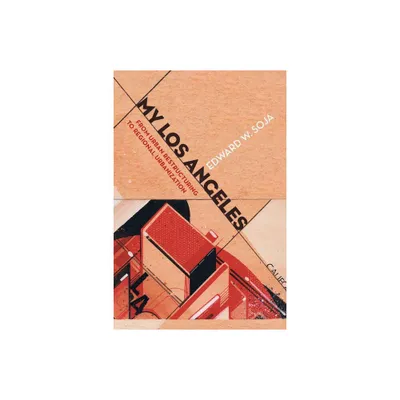Home
My Los Angeles: From Urban Restructuring to Regional Urbanization / Edition 1
Loading Inventory...
Barnes and Noble
My Los Angeles: From Urban Restructuring to Regional Urbanization / Edition 1
Current price: $34.95


Barnes and Noble
My Los Angeles: From Urban Restructuring to Regional Urbanization / Edition 1
Current price: $34.95
Loading Inventory...
Size: OS
*Product Information may vary - to confirm product availability, pricing, and additional information please contact Barnes and Noble
At once informative and entertaining, inspiring and challenging,
My Los Angeles
provides a deep understanding of urban development and change over the past forty years in Los Angeles and other city regions of the world. Once the least dense American metropolis, Los Angeles is now the country’s densest urbanized area and one of the most culturally heterogeneous cities in the world. Soja takes us through this urban metamorphosis, analyzing urban restructuring, deindustrialization and reindustrialization, the globalization of capital and labor, and the formation of an information-intensive New Economy. By examining his own evolving interpretations of Los Angeles and the debates on the so-called Los Angeles School of urban studies, Soja argues that a radical shift is taking place in the nature of the urbanization process, from the familiar metropolitan model to regional urbanization. By looking at such concepts as new regionalism, the spatial turn, the end of the metropolis era, the urbanization of suburbia, the global spread of industrial urbanism, and the transformative urban-industrialization of China, Soja offers a unique and remarkable perspective on critical urban and regional studies.
My Los Angeles
provides a deep understanding of urban development and change over the past forty years in Los Angeles and other city regions of the world. Once the least dense American metropolis, Los Angeles is now the country’s densest urbanized area and one of the most culturally heterogeneous cities in the world. Soja takes us through this urban metamorphosis, analyzing urban restructuring, deindustrialization and reindustrialization, the globalization of capital and labor, and the formation of an information-intensive New Economy. By examining his own evolving interpretations of Los Angeles and the debates on the so-called Los Angeles School of urban studies, Soja argues that a radical shift is taking place in the nature of the urbanization process, from the familiar metropolitan model to regional urbanization. By looking at such concepts as new regionalism, the spatial turn, the end of the metropolis era, the urbanization of suburbia, the global spread of industrial urbanism, and the transformative urban-industrialization of China, Soja offers a unique and remarkable perspective on critical urban and regional studies.


















